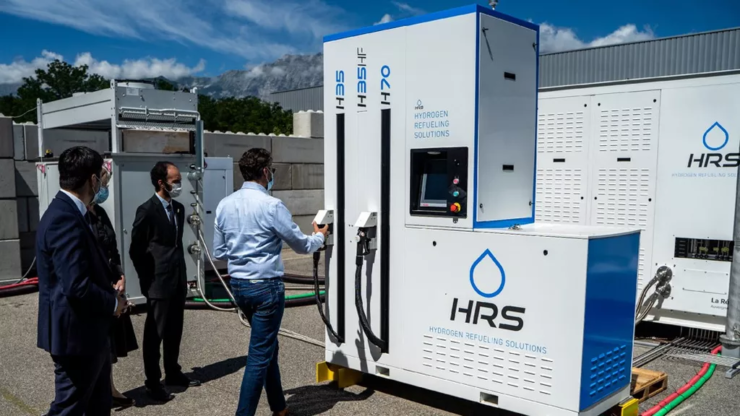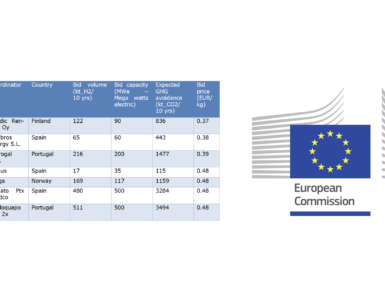Hydrogen: an energy carrier more than ever at the forefront.
War in Ukraine, climate crisis… Decarbonising industry and mobility is now a national and European priority. Hydrogen seems to be at the heart of these transformations, provided it is clean.
Two hundred years that the hydrogen fuel cell is well known to scientists, but it is only that this technology could come out of the laboratories:
Olivier Joubert, director of the CNRS Hydrogen Research Federation (FRH2) and researcher at the Jean-Rouxel Institute of Materials in Nantes, said:
🔥 What about we co-host a webinar? Let's educate, captivate, and convert the hydrogen economy!
Hydrogen Central is the global go-to online magazine for the hydrogen economy, we can help you host impactful webinars that become a global reference on your topic and are an evergreen source of leads. Click here to request more details
We are moving towards a world of electricity in whichhydrogenwill have its place alongside conventional batteries.
In addition, the combination of the climate emergency and the need for energy sovereignty are pressing politicians and industries to accelerate the transition to this energy vector.
Christelle Werquin, general delegate of the France hydrogen association, bringing together more than 450 French players in the sector, said:
The war in Ukraine is changing the situation: to get out of Russian dependence even faster, we must strengthen ambitions on hydrogen.
Producing in Europe, clean, fast and cheap: the impossible bet
Proof of this is that Europe, thanks to theREPowerEU plan, aims to consume 20 million tonnes by 2030. Thus, 30% of European primary steel production should be decarbonised through the use of renewable hydrogen within just over fifteen years.
Currently, producing hydrogen is not so green: per kilogram of hydrogen produced, between 10 kg and 12 kg of CO2are emitted. “We currently use hydrocarbons to make it, but we know how to do better, thanks to electrolyzers, which make it possible to store electricity from solar or wind power, for example. Only problem, it’s very expensive, “notes Olivier Joubert.
Christelle Werquin, General Delegate of the France Hydrogen Association, said: “We consider that we must focus on low carbon, i.e. less than 3.38 kg of CO2 per kilogram of hydrogen.”
To succeed in making clean hydrogen, it will therefore require the production of green electricity, and many electrolyzers. Impossible, according to Christelle Werquin: “If we only rely on renewables, we will not succeed. We will need it, but we cannot wait because we must produce massively and lower costs today. At France Hydrogen, we consider that we must focus on low carbon, i.e. less than 3.38 kg ofCO2per kilogram of hydrogen. »
For Pierre-Etienne Franc, CEOof Hy24 – a hydrogen investment platform and joint venture between the Ardian fund and FiveT Hydrogen – it is also necessary to leave room for imports:
“Europe will not be able to produce alone: we do not have enough space, it is too expensive and it takes too long. Tomorrow, the energy mix of the France will be nuclear, some local hydrogen and imported renewable energy in the form of ammonia or hydrogen. Of the 20 million tonnes of hydrogen provided for in the REPowerEU plan, Brussels expects half to be imported.”
A race against time
In addition to European borders, the competition for carbon-free hydrogen is already underway. While Joe Biden is putting the United States out of the shadows when it comes to hydrogen through theInflation Reduction Act, China and South Korea have already embarked this energy carrier in several thousand vehicles and have the infrastructure to accommodate future imports.
Europe is, in theory, well positioned, thanks to strong public support and good cooperation between the worlds of industry and research.
Pierre-Etienne Franc, said:
We must stay in the game: move as fast as them.
“The United States is fortunate to be self-producing: it will want to export. Europe, South Korea, Singapore will fight to import cheaply. It is therefore now that we must equip the major French ports so that they can receive hydrogen and redistribute it to their neighbors. »
Downstream, it will be up to companies to adapt and integratehydrogen into industrial processes.” We also need to think about new hydrogen professions, from engineer to technician,” says Christelle Werquin. Schools are therefore not spared by the hydrogen subject and will also have to adapt.
READ the latest news shaping the hydrogen market at Hydrogen Central
Hydrogen: an energy vector more than ever in the spotlight, November 16, 2022








